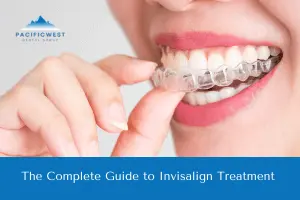According to the Canadian Sleep Society, approximately 8 percent of adults and 13 percent of children in Canada experience teeth grinding or clenching – most often in their sleep.
Teeth grinding or clenching (often called bruxism) can be caused by several things:
- Anxiety;
- Stress;
- Disrupted Sleep;
- Misaligned teeth; and/or
Most people who clench or grind their teeth typically do not realize they are doing so.
Some signs of bruxism may include:
- Headaches;
- Earaches;
- Tooth Sensitivity;
- Tooth or Jaw Pain;
- A third party hears the noise of grinding (especially at night).
When you clench or grind your teeth, a huge amount of pressure is exerted on your teeth and jaw. Continual clenching or grinding can lead to cracked, chipped, broken, or loose teeth and the potential for damage to the Temporomandibular joint.
Diagnosing Clenching or Grinding
If you see a dentist regularly in Surrey, they will monitor your mouth for signs of irregular wear and tear on the surfaces of the teeth. It is important to always let your dentist know if you are experiencing any unusual pain or sensitivity in your teeth, head, or neck area – this can help to diagnose bruxism early and limit damage.
Preventing Bruxism
If you become aware of clenching your teeth, try to make an effort to relax the jaw and stop the clenching. Stress-reducing activities such as exercise may be beneficial if the bruxism is being caused by external stress. Depending on the reason for your clenching and grinding, your dentist may recommend corrective treatments for your mouth or may want you to wear a custom-fit mouth guard at night to reduce the pressure on your teeth.

Hello! I’m Dr. Kevin Lee, a certified orthodontic specialist at PacificWest Dental Group, proudly serving the vibrant communities of Vancouver and Surrey. My journey into orthodontics began back in high school. As a teenager wearing braces, I became fascinated by the intricate blend of art, engineering, and biology that defines this field. This early experience ignited a passion that has guided me throughout my career.
I pursued my academic journey at the University of British Columbia (UBC), where I earned a Bachelor of Science in Biochemistry in 2006, followed by a Doctor of Dental Medicine in 2011. After a year-long residency at Montefiore Medical Center in New York, I returned to UBC to complete a combined Master of Science in Craniofacial Biology and a Diploma in Orthodontics in 2015. That same year, I achieved certification from both the Royal College of Dentists of Canada and the American Board of Orthodontics.
With over a decade of clinical experience, I remain deeply committed to staying at the forefront of orthodontic advancements. At PacificWest Dental Group, we prioritize personalized treatment plans tailored to each patient’s unique needs, ensuring comfort and care every step of the way. Our goal is to help you achieve the smile you’ve always dreamed of in a welcoming and supportive environment.
Outside the clinic, I enjoy engaging with our community and staying active. Whether it’s through local events or outdoor activities, I believe in building strong relationships both inside and outside the office. I look forward to meeting you and working together to create a beautiful, confident smile.
Services we provide:
-Invisalign
-Braces
-Lingual Braces
-Digital treatment planning
-TMJ and headpain treatment
-Laser Therapy
-Sleep Apnea Oral Appliance
-Dysport Cosmetic Injectables





